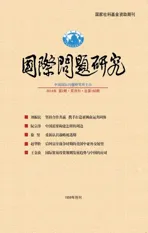ABSTRACTS
2014-03-28
Adhering to Win-win Cooperation:Jointly Creating A Community of Common Destiny in Asia
Liu Zhenmin
Since the beginning of the twenty-first century,the collective rise of Asian developing countries has rewritten the world’s political and economic landscape.In striving to achieve the China dream of great rejuvenation of the nation,China has sought to work with its Asian neighbors to jointly create regional peace,stability and prosperity.To this end,China has presented the concept of‘a community of common destiny’,with common development the core principle that aims to maintain a safe environment with mutual trust and cooperation,promote the construction of a mechanism of openness and inclusiveness,build consensus with cultural mutual learning,and strengthen emotional bonds by working together with one accord in time of difficulties.The construction of a community of common destiny encapsulates the essence of traditional Asian history and culture,conforms to the trend of world and regional development,reflects the common interests of regional countries,and indicates the direction of China’s diplomatic policy with its neighboring countries.In the future,China will continue to promote good neighborly relations via high-level exchanges,promote common development in Asia with its own development,promote community building with regional cooperation,maintain peace and stability with security cooperation,and enrich the content of a community of common destiny with cultural exchanges.China hopes to jointly work with regional countries to build prosperity in Asia and make greater contributions to the cause of human peace and development.
China’s Neighborhood Diplomacy: Striving for A Stable and Prosperous Neighborhood
Ruan Zongze
China requires a peaceful and stable neighboring environment to enable its development,while nearby countries also require a peaceful and prosperous China.In recent years,China’s surrounding areas have experienced profound changes.A double-center structure led by the United States and China has emerged in western Pacific areas.With the aim of realizing the‘China dream’ of national rejuvenation and creating a favorable international environment,China’s periphery diplomacy will take following concrete measures:advance relations with major countries to forge sound interactions,promote the‘Silk Road Economic Belt’ and the‘Twenty-first Century Maritime Silk Road’to drive more dynamic economic cooperation,improve relevant mechanisms to achieve higher efficiency,and clear away disturbances to adhere to the path of peaceful development.
The Period of Strategic Opportunities:New Phase,New Challenges and New Responses
Xu Jian
The power and order of the world is currently undergoing restructure.China is also experiencing a fundamental transformation in its economic and social development models.In these circumstances,the conditions that generate China’s strategic opportunity period are no longer relatively stable and spontaneous,but are more vulnerable.This demands stronger ability to take the initiative.The country’s development is also facing substantial change,with the current economic development’s focus on quantity expansion being replaced by growth focused on quality enhancement.The economic cost of maintaining and employing this strategic opportunity period will be much higher.In response to these changes,China should strength its ability to properly handle complicated and arduous international situations,encourage and elevate innovation as its core source of competitiveness,and improve its ability to create a more favorable external environment for the current economic and social development transformations,and to enable sustainable development in the future.
U.S.Policy in Central Asia after the Withdrawal from Afghanistan
Zhao Huasheng
During the past 13 years,the war in Afghanistan has dominated the U.S.Central Asia policy.After the U.S.withdrawal from Afghanistan,the structure of the U.S.interests in Central Asia will change because the war in Afghanistan will no longer be the dominant factor in U.S.policy in Central Asia.Central Asia’s role in U.S.foreign policy will decrease,and the U.S.’s concern for Central Asia will subsequently be reduced.The position of the U.S.in Central Asia will decline,but its freedom of policy choice will be increased.Russia and China’s influence will rise,and the geopolitical importance of Central Asia will return to the main focus of American policy.The competition between the world powers will change to a new form.The U.S.will continue to promote the new ‘silk road’ strategy to continue to participate in the‘great game’ in Central A-sia,but there are different opinions regarding whether Russia or China will be the main opponent to the U.S.in the region.
TPP and TTIP:New Formulation of International Rules and its Implications for China
Wang Jinbo
Asia-Pacific cooperation has entered a new stage in which the Trans-Pacific Partnership(TPP)and Regional Comprehensive Economic Partnership(RCEP)will shape the regional cooperation framework.New trade agreements,represented by the TPP,Transatlantic Trade and Investment Partnership(TTIP)and Trade in Services Agreement(TISA),have taken the lead in establishing new rules,standards and models of global trade and investment.Based on the new trends of international economic rule,China should promote the development of high-level free trade agreement(FTA)to complete its strategic arrangement for regional integration.In addition,China should consider and advocate a new strategic agenda in order to realize its core objectives of reshaping the world trade system and establishing a new international economic order.This will pave the way for China to participate in regional and global governance.
